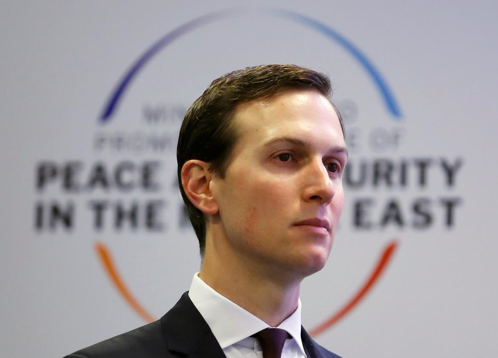
(Washington, D.C.) — How could a final, comprehensive peace treaty with Israel truly improve the day-to-day lives of Palestinians living in the West Bank and Gaza?
What specific, innovative ideas have the Trump team been cooking up over the last two years to reduce rampant unemployment and poverty among the Palestinians, and build infrastructure to economic growth and prosperity, like water desalination plants, power plants, roads, ports, an airport, and so forth?
How much will these proposals cost, and what nations are ready to invest in helping the Palestinians build a healthy, fully functioning economy that will create good jobs, rising wages, clean water, 24/7 power, and sustained economic growth that depends on free market innovation, not foreign aid and government subsidies?
These are critically important questions, and the White House peace team — led by Jared Kushner — announced today that they will unveil their answers at a conference in Bahrain in late June that will focus on the economic benefits of peace.
They further noted that they will unveil their answers to the key political questions — what will the final borders of two states be? what will be done with Jerusalem? what will be done with Palestinian refugees living outside the land? — at a later date.
This is a shrewd move, for several reasons:
- It will focus the Palestinian people first on what they would “get” from making peace with Israel, not first on what they might have to “give.”
- It will create a conversation not just among Palestinian Arabs but among Arabs throughout the region on whether the Trump team is making specific, positive and useful proposals to make the lives of real people better.
- No previous American administration has ever offered a detailed financial plan to improve the Palestinian economy and infrastructure.
- We’ll get to see what countries are willing to invest the billions of dollars necessary to turn these ideas into reality.
It’s particularly noteworthy and encouraging that Bahrain is hosting the conference. While I have not been to Bahrain, I had lunch in March with the Bahraini Ambassador to the United States and was deeply impressed with him and his government’s desire to help Israelis and Palestinians truly make peace, and open the door for Arab states throughout the Gulf region to also make peace with Israel and openly engage in business with the Jewish state.
- “The Trump administration will unveil the first phase of its long-awaited blueprint for Mideast peace next month at a conference in the region designed to highlight economic benefits that could be reaped if the Israeli-Palestinian conflict is resolved,” the Associated Press reported on Sunday.
- “The plan, which has been two years in the making, envisions large-scale investment and infrastructure work in the Palestinian territories,” AP noted. “But the central political elements remain mostly unknown. And the economic workshop, June 25-26 in Bahrain, will not address the most contentious parts of the conflict: borders, the status of Jerusalem, Palestinian refugees and Israel’s security.”
- “We recognize that this needs to go hand in hand with the political plan, but this will be the first chance to roll out details of the economic plan,” a White House official toldCNN, adding that this will be an opportunity to show Palestinians, Jordanians, Israelis and the Lebanese that “CEOs care about them and want to be investing in the area.”
- “It’s tough to digest both the economic and political proposals at once, since they’re both very detailed proposals,” the official said.
- “[The] ‘Peace to Prosperity’ [conference in Bahrain] will facilitate discussions on an ambitious, achievable vision and framework for a prosperous future for the Palestinian people and the region, including enhancements to economic governance, development of human capital, and facilitation of rapid private-sector growth,” a White House official told the Washington Free Beacon. “If implemented, this vision has the potential to radically transform lives and put the region on a path toward a brighter future.”
—————————-
____________________
——————————